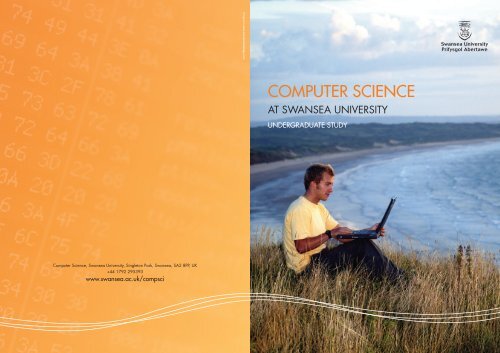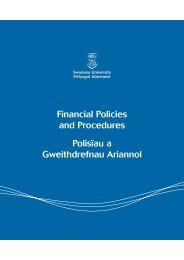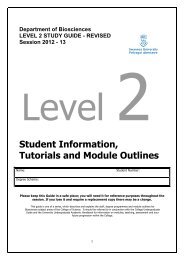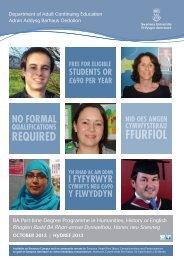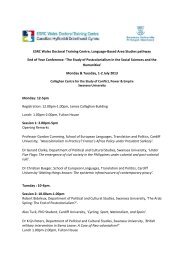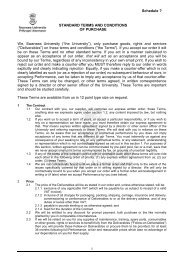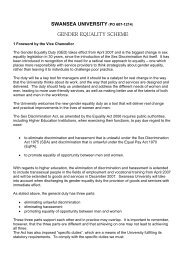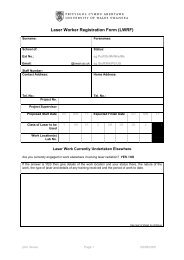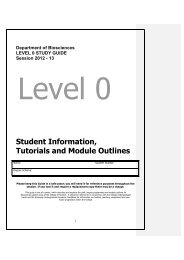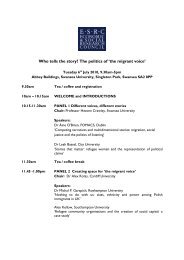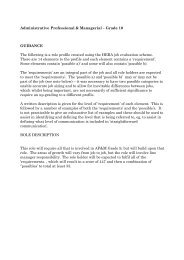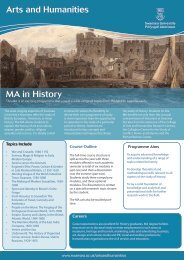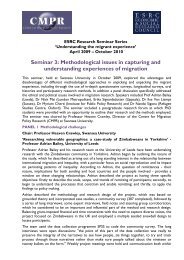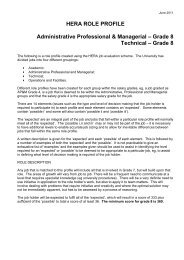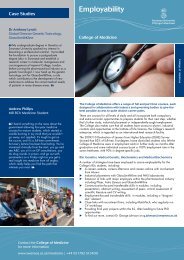COMPUTER SCIENCE - Swansea University
COMPUTER SCIENCE - Swansea University
COMPUTER SCIENCE - Swansea University
You also want an ePaper? Increase the reach of your titles
YUMPU automatically turns print PDFs into web optimized ePapers that Google loves.
Designed by www.iconcreativedesign.com<br />
<strong>COMPUTER</strong> <strong>SCIENCE</strong><br />
AT SWANSEA UNIVERSITY<br />
UNDERGRADUATE STUDY<br />
Computer Science, <strong>Swansea</strong> <strong>University</strong>, Singleton Park, <strong>Swansea</strong>, SA2 8PP, UK<br />
+44 1792 295393<br />
www.swansea.ac.uk/compsci
01<br />
WELCOME<br />
Computer Science is about data, algorithms,<br />
programs and computers; it is also about<br />
how these technical ideas are transforming<br />
the world. Computer Science is a young<br />
academic subject and rich in applications,<br />
since computing systems are everywhere:<br />
in science and engineering, medicine, design<br />
and manufacture, commerce and public<br />
service, defence, transportation, arts and the<br />
media, social life and the home. Information<br />
processing technology allows many people<br />
to use computing systems to create, store,<br />
transform and communicate written,<br />
aural and visual information.<br />
Computer Science is the discipline that leads the long<br />
tradition of mechanisation in our world. The influence<br />
and achievements of Computer Science are destined to<br />
grow for decades. Our education in Computer Science<br />
will provide you with the competence to participate in<br />
a long revolution. The knowledge will enable you to<br />
understand and foresee the great opportunities and<br />
challenges that Computer Science presents to the<br />
world, now and in the future.<br />
Professor J V Tucker<br />
WHY STUDY <strong>COMPUTER</strong><br />
<strong>SCIENCE</strong> AT SWANSEA?<br />
<strong>Swansea</strong> offers:<br />
• Friendly staff committed to a student experience and education<br />
of a very high standard.<br />
• A top research environment, containing the highest percentage<br />
of world leading researchers in any Computer Science<br />
Department in Wales (and the 12th highest in the UK) in<br />
the most recent national research assessment RAE 2008.<br />
• A large industrial programme IT Wales that arranges for<br />
companies to support students through projects and vacation<br />
employment.<br />
• Excellent employment prospects in an ever growing and<br />
changing computing and ICT industry.<br />
• Excellent transferable skills that open doors to careers in all<br />
sectors of the economy.<br />
• A range of entry scholarships and bursaries.<br />
• A department with over 40 years of commitment to the best<br />
international standards of university education.<br />
• A university with a high success rate for graduation, low drop<br />
out rate, and excellent student support.<br />
• A campus university, set in parkland, overlooking the sea, and<br />
close to both the city of <strong>Swansea</strong> and the dramatic Gower<br />
Peninsula.<br />
• A city with excellent entertainment and shopping, and active<br />
scientific, cultural and sporting scenes.
01<br />
WHY STUDY <strong>COMPUTER</strong><br />
<strong>SCIENCE</strong> AT SWANSEA?<br />
<strong>Swansea</strong> offers:<br />
• Friendly staff committed to a student experience and education<br />
of a very high standard.<br />
• A top research environment, containing the highest percentage<br />
of world-leading researchers in any Computer Science<br />
Department in Wales (and the 12th highest in the UK) in<br />
the most recent national research assessment RAE 2008.<br />
• A large industrial programme IT Wales that arranges for<br />
companies to support students through projects and vacation<br />
employment.<br />
• Excellent employment prospects in an ever growing and<br />
changing computing and ICT industry.<br />
• Excellent transferable skills that open doors to careers in all<br />
sectors of the economy.<br />
• A range of entry scholarships and bursaries.<br />
• A department with over 40 years of commitment to the best<br />
international standards of university education.<br />
• A university with a high success rate for graduation, low drop<br />
out rate, and excellent student support.<br />
• A campus university, set in parkland, overlooking the sea, and<br />
close to both the city of <strong>Swansea</strong> and the dramatic Gower<br />
Peninsula.<br />
• A city with excellent entertainment and shopping, and active<br />
scientific, cultural and sporting scenes.
02<br />
03<br />
WHAT CAN I STUDY AT SWANSEA?<br />
Most of our students study for a Bachelor or Master’s degree:<br />
• BSc Computer Science – a three-year degree that teaches a wide spectrum of topics in computing and<br />
that provides a foundation for a huge range of careers inside and outside computing.<br />
• MEng Computing – a four-year degree that focuses on advanced software development and is intended<br />
for those looking for a high-flying career in the software industry.<br />
It is possible to transfer between BSc Computer Science and MEng Computing in the first two years of study.<br />
We also offer more specialised degrees:<br />
• Computing and Communications – a three-year degree that combines Computer Science with digital<br />
communication networks and technology.<br />
• Mathematics for Computer Science – a three-year degree that focuses on the mathematics that drives modern<br />
Computer Science.<br />
• Computer Science with a Modern Language – three-year degrees that combine Computer Science with French,<br />
German, Italian Spanish or Welsh and include a year’s residence abroad.<br />
• Computing with Finance – a three-year degree that concentrates on Computer Science and the finance systems.<br />
• Joint Honours degrees with Psychology, Physics and Geo-informatics – these three degrees consist of about<br />
50% Computer Science and 50% from one of Psychology, Pure Maths, Physics or Geography.
04<br />
05<br />
WHAT OUR STUDENTS SAY…<br />
Profile<br />
Sophie Dare-Edwards<br />
MEng Computing<br />
Profile<br />
Jean Jose Razafindrakoto<br />
BSc Computer Science<br />
“<strong>Swansea</strong> <strong>University</strong> was one of the very few universities in the<br />
UK offering the MEng Computing course that I was really<br />
interested in.<br />
The lecturers on the course have been really great, providing<br />
notes and extra help if you need it as well as lab classes to help<br />
you apply what is being learnt to practical situations.<br />
I was impressed by how many facilities are available on campus;<br />
the library is extremely well-equipped and there is the Taliesin Arts<br />
Centre, Lloyds TSB bank and Waterstones plus some great cafes<br />
and food outlets. The Sports Village across the road has a<br />
brilliant range of facilities including 50-metre swimming pool.”<br />
“<strong>Swansea</strong> is a wonderful place; it has everything that a student<br />
could want in a city. It is relaxed and peaceful but also vibrant and<br />
full of life. Coming from Madagascar and having family in France I<br />
felt that the UK and especially <strong>Swansea</strong> would be the perfect place<br />
for my studies.<br />
The facilities in the Department and on campus are great.<br />
The library provides all the materials I need.<br />
The course is everything I expected. The Department offers a great<br />
combination of theory and practice and the lecturers are really<br />
helpful; I have learnt so much from them.”<br />
Profile<br />
Dan Craggs<br />
MEng Computing<br />
“The lecturers in the Department are first class, and deservedly worldrenowned.<br />
There is always somebody available whatever issue you have,<br />
and support frameworks are in place to get problems solved very quickly.<br />
The IT facilities are consistently kept up to date. The library is very<br />
accessible, and provides good support for students.<br />
<strong>Swansea</strong> is a developing city and constantly moving forward. The<br />
<strong>University</strong>’s situation on the shoreline is fantastic. The Students’ Union is<br />
very active and organises some great social events.<br />
Considering the facilities, support and location, I’m not surprised<br />
<strong>Swansea</strong> <strong>University</strong> won the 2005 Times Higher “Best Student<br />
Experience Award.”<br />
Profile<br />
Sean Handley<br />
BSc Computer Science<br />
“The Department has a good ranking in the university league tables.<br />
On the course, the lecturers' doors are always open to students and<br />
the help provided is very good; I was never lacking any information<br />
or assistance I needed.<br />
I was impressed by the city and surrounding area in terms of things<br />
to see and do. <strong>Swansea</strong> <strong>University</strong> and the city itself provide great<br />
facilities for students, and the Gower Peninsular is just stunning.<br />
I found the IT Wales industrial unit run in conjunction with the<br />
Department of Computer Science very helpful in terms of support<br />
when it came to deciding what to do after graduation. Their advice<br />
ultimately led me to the company for whom I currently work. I<br />
recommend them to anyone looking to work in IT in Wales.”
06<br />
07<br />
WHAT WILL I LEARN?<br />
Computer Science is about much more than just computers and software. Computer Science<br />
responds to and influences the world and so the subject changes continually. Our degree<br />
programmes give you a firm understanding of the foundations of the subject and the ability<br />
to master new technologies – just what you need to feel at home at the cutting edge.<br />
BSc <strong>COMPUTER</strong> <strong>SCIENCE</strong><br />
The BSc in Computer Science is a three-year programme<br />
designed to teach you the central ideas and methods<br />
of computing.<br />
In the first year you will learn how to program and much<br />
more. In the first term you will be introduced to the basic<br />
concepts of programming and how to solve standard<br />
programming problems. In the second term you will be<br />
taught more advanced ideas – how to structure data to<br />
solve problems more effectively and easily, how to use<br />
software tools to help you program, and how to test and<br />
debug your software. The main programming language<br />
we use is Java though we also introduce a specialised<br />
language called Haskell.<br />
As well as programming, you will learn how computer<br />
systems work – including the hardware, operating systems<br />
and networks. You will also start to learn about the<br />
theoretical ideas upon which Computer Science rests.<br />
For this you need discrete mathematics, which we teach<br />
in the first year. Discrete mathematics is not like A-level<br />
mathematics, and you do not need an A-level in<br />
mathematics to study Computer Science at <strong>Swansea</strong>.<br />
(You can find more information about this in the section<br />
‘What Qualifications Do I Need?’ Page 18.) Finally,<br />
computer scientists have ethical and legal responsibilities;<br />
for example, many have access to sensitive data. We<br />
teach you about these responsibilities, and about<br />
how Computer Science affects society.<br />
In the second year, you will build on what you learned in<br />
the first year and encounter new topics. You will study<br />
more advanced programming concepts, as well as<br />
software engineering – the art of successfully building<br />
complex software systems. When you study algorithms,<br />
you will deepen your knowledge of how to structure data<br />
and choose good solutions to problems. You will think<br />
about fundamental questions about computing: Can you<br />
compute anything you want to? Are there problems that<br />
you can solve in theory, but in practice take so long<br />
there’s no point in trying? How do you design a<br />
programming language? Can you use any programming<br />
language to solve a problem? Why are some ‘better’<br />
than others for some problems? How do you specify<br />
what a computer system is supposed to do and check<br />
what it actually does?<br />
Many computer systems execute programs in parallel,<br />
when there are many things going on at once; for<br />
example, you may have heard of multithreaded, multicore,<br />
and distributed systems. An important theme in the<br />
second year is the study of such concurrent systems.<br />
This affects programming, networking, operating systems<br />
and computer hardware. Further new topics you will<br />
study include databases, computer graphics, and<br />
artificial intelligence.<br />
In the final year of the BSc in Computer Science you<br />
choose the areas that interest you. You will undertake a<br />
large project – usually this is about building a software<br />
application, but it could be about many things from<br />
fundamental theory to history and social impact. There are<br />
many suggested projects to choose from – including some<br />
in collaboration with industry, and you can suggest your<br />
own project. The rest of the third year is made up of<br />
courses you choose from a wide range of options –<br />
popular options include web programming, security,<br />
graphics and system programming.<br />
The BSc in Computer Science is accredited by the<br />
British Computer Society.
08<br />
09<br />
MEng COMPUTING<br />
As well as a BSc degree, we also offer an MEng degree in Computing. In general, MEng degrees are four years<br />
rather than three, and are about the professional skills to practice a particular subject – in the case of the MEng<br />
Computing, that means the ability to specify, design, build and manage large software systems on time and on<br />
budget. Unlike BSc degrees, an MEng degree can be accredited for full Chartered Engineer (CEng) status. Ours<br />
is fully accredited for CEng by the British Computer Society. Because of this and the advantages it gives students<br />
desiring a career in software, the MEng Computing programme is becoming more popular – a significant number<br />
of our students now either apply for it initially, or transfer to it part way through their BSc degree.<br />
The first three years of the MEng Computing are the same as the BSc in Computer Science, which makes it easy<br />
to swap from one to the other. The fourth year concentrates on the professional skills needed to complete software<br />
projects on time to a high standard. Half of the fourth year is made up of projects – a large individual industrial<br />
project and another large group project. Unlike the projects in the third year of the BSc that can be about almost<br />
anything to do with computing, MEng projects must be about constructing software. As well as projects, MEng<br />
students study courses on business and commercial practice, and, of course, they also choose some advanced<br />
computing courses.<br />
JOINT DEGREES<br />
Computer Science combines naturally with other subjects. In designing such joint degree programmes we:<br />
• Emphasise essential skills – for example, programming.<br />
• Emphasise topics in Computer Science that connect with the other subject – for example, for Computer Science<br />
and Psychology that means courses on human-computer interaction (because psychologists are interested in<br />
how people interact with computers) and artificial intelligence (because psychologists are interested in<br />
thinking and intelligence).<br />
• Let students choose those parts of Computer Science they find most interesting.<br />
cAPTION:<br />
Hardware, current and historical<br />
Top and Centre: The front panel of the <strong>University</strong>'s first computer, an IBM 1620 bought in 1962. This, together with the other historical items shown, is currently in<br />
our museum collection. Bottom left to right: A calibration ruler for a punched card machine. The ruler was used to make sure the holes were punched in exactly the<br />
right places. An IBM flowchart stencil, widely-used by Computer Scientists in the 1960s and 70s to design programs on paper. A rare IBM hexadecimal<br />
adder/subtractor, used to calculate in base 16. Middle right: Inside a hard-drive: the circular disk, or platter, that is visible is the topmost one of a stack. You can<br />
also see the read-write head and the mechanism for controlling it (in the background). This disk was faulty when it was dismantled – please don't take a working<br />
one apart! Middle left: Just one small part of one of the department's many racks containing high-speed (Gigabit) network switches. As well as a high-speed<br />
wired network, the department is part of a campus-wide wireless network.<br />
Part of the Robert Recorde Memorial in the Computer Science Department<br />
Robert Recorde (1510 – 1558) was a Welsh<br />
mathematician who wrote the first book in English on<br />
calculation with the Arabic number system (in 1542) and<br />
also designed and first used the equals sign in algebra<br />
(in 1557) which are key to modern computing.
10<br />
11<br />
INTERNATIONAL<br />
The international community is always present in Computer Science at <strong>Swansea</strong>. Computer Science at<br />
<strong>Swansea</strong> has many international students from China, India and Pakistan, the Middle East and Europe.<br />
We have international staff and visitors from China, North America, virtually every country in Europe, Iran,<br />
India and Pakistan, as well as staff who have worked in many of these countries and others (for example New<br />
Zealand). This means we have a lot of experience of the challenges that students face when coming from another<br />
country. It also means we have a strong international culture in the department – and many of our international<br />
students stay to study for postgraduate degrees, and in some cases as staff.<br />
EDUCATIONAL AIMS<br />
Because Computer Science is about more than just computers and software, and because<br />
the subject changes rapidly, we have formulated a set of nine educational aims that<br />
summarise our teaching programmes and help you understand what you will gain:<br />
1. Practical experience and theoretical understanding of design methods for the specification, programming<br />
and analysis of a wide range of computing systems.<br />
2. A fundamental understanding of the scope and limits of Computer Science and Artificial Intelligence,<br />
and of their applications.<br />
3. Knowledge of the history and present state of Computer Science, and an insight into future technologies<br />
and their role in applications and society.<br />
4. The ability to plan and accomplish a substantial project.<br />
5. Relevant mathematical knowledge and experience in its applications.<br />
6. Experience in co-operative working through team projects, with their demands on the management<br />
of partners and time.<br />
7. Skills in written and oral communication.<br />
8. Skills in locating information, and the ability to read critically, to précis and to judge information.<br />
9. The ability and confidence to learn, unaided, complex new subjects.
12<br />
13<br />
HOW WILL I STUDY?<br />
We schedule many different kinds of teaching and you are also expected to work on your own –<br />
to complete assignments and to learn about the subjects you are studying in more detail. There is<br />
plenty of time for private study. The teaching of each subject is organised into a module. Many<br />
modules in Computer Science are based on one-hour lectures. Normally there will be two lectures<br />
per week for each module; in most terms you will study six modules so you can expect to attend<br />
about 12 lectures a week. Lectures are supported by other forms of teaching:<br />
• Practical laboratory classes let you put into practice what you have learned. In the first year, you will be in about<br />
two laboratory classes a week (usually lasting one or two hours each).<br />
• Seminars are also used for skills that cannot be taught well in lectures – for example, writing reports and making<br />
presentations. Seminars are also used in the first year to show how the mathematics that we teach is applied in practice.<br />
• Tutorials are regular small group meetings in which you and your tutor will discuss current work. Tutorials provide<br />
extra support, for example, by explaining concepts in different ways to deepen your understanding.<br />
How will I be assessed?<br />
The majority of modules are assessed by a combination<br />
of examinations and coursework – though a few are<br />
based only on coursework or only on an exam;<br />
commonly, a module will be assessed 30% by coursework<br />
and 70% by examination. Your final degree classification<br />
for three-year BSc degrees is based on a combination<br />
of marks from the final two years of study, and for the<br />
four-year MEng degree on the final three years of study.<br />
What about equipment?<br />
The Department is well-equipped for undergraduate<br />
teaching, and is continually upgrading its laboratories to<br />
ensure equipment is up-to-date – equipment is never more<br />
than three years old, and rarely more than two. Currently,<br />
students use three fully networked laboratories: one,<br />
running Windows; another running Linux; and a project<br />
laboratory, containing specialised equipment. These<br />
laboratories support a wide range of software, including<br />
the programming languages Java, C# and the .net<br />
framework, C, C++, Haskell and Prolog among many;<br />
integrated programme development environments such as<br />
Visual Studio and Netbeans; the widely-used Microsoft<br />
Office package; web access tools; and many special<br />
purpose software tools including graphical rendering and<br />
image manipulation tools; expert system production tools;<br />
concurrent system modelling tools; World Wide Web<br />
authoring tools; and databases.<br />
As well as the computers in the Department, the university<br />
provides computing equipment for all students – there are<br />
hundreds of open access PCs across the campus – as<br />
well as file storage space on the <strong>University</strong>’s servers and<br />
wireless network access across the whole campus and<br />
all <strong>University</strong> accommodation.<br />
We also recognise that most students will want to use their<br />
own computers – and will want access to the same software<br />
they are using on the <strong>University</strong>’s computers. So we only<br />
choose software that is either freely available to everybody,<br />
or that is freely available through special agreements we<br />
have with software companies. One agreement is with<br />
Microsoft, allowing us to make most Microsoft applications<br />
and operating systems available for free.<br />
What about industrial experience?<br />
Work experience in industry is an advantage to any<br />
graduate when choosing a career. Our student placement<br />
scheme gives undergraduates the opportunity to undertake<br />
interesting, well-paid vacation work in organisations in<br />
Wales – usually small and medium-sized companies,<br />
though large companies (e.g., Hewlett-Packard, Qinetic<br />
and Logica-CMG) and public services (e.g., South Wales<br />
Police) are involved. Students in the scheme often find that<br />
they are in a position of considerable responsibility within<br />
the company; occasionally, they have more computing<br />
experience than anyone else. Students can build<br />
long-term links with a company, which can lead to<br />
an industry-related final-year project and, sometimes,<br />
to an appointment after graduation.<br />
IT Wales<br />
Our student placement scheme is run by IT Wales, an<br />
industrial and community programme founded by the<br />
Computer Science Department at <strong>Swansea</strong> in 1993.<br />
Our full-time industrial liaison team links the academic<br />
expertise and resources in Computer Science to the skills<br />
and technical requirements of commerce and industry.<br />
This relationship helps ensure that our students have the<br />
skills they need.<br />
IT Wales is supported by European Union, the Welsh<br />
Assembly Government and hundreds of companies.<br />
The student placement scheme is so successful, it is<br />
now offered throughout Wales; the Computer Science<br />
Department at <strong>Swansea</strong> is the administrative centre.<br />
Because of our long experience, our students have<br />
a leading role in the scheme and its development.<br />
What careers can I seek?<br />
Most of our graduates start in the software industry,<br />
which is huge and diverse with many different career<br />
options. Computing graduates often specialise in some<br />
type of software, some examples are: web services,<br />
financial software, games, control systems, security,<br />
databases. Within a software company, graduates can<br />
be employed in management, programming, requirements<br />
analysis (what the software is supposed to do for the<br />
client), design and testing. In a large company, graduates<br />
often specialise early on. In a small company, graduates<br />
have to be more flexible and work in a number of areas,<br />
which many prefer as it makes their careers more varied.<br />
Related to the software industry, Computer Science<br />
graduates are also often employed to set up, maintain and<br />
manage computer systems and software, rather than write<br />
applications. Finally, some computer science graduates<br />
feel they need a more advanced education and study for<br />
an MSc or PhD in some specialised field.
14<br />
15<br />
GREGYNOG<br />
WHAT IS LIFE LIKE IN SWANSEA?<br />
For over 25 years the staff and students of the Computer Science Department have<br />
attended our three-day annual conference at Gregynog, a large house that is now<br />
a cultural centre set in an 80-hectare estate in Mid Wales. All final year students<br />
give talks on their project work, and attend lectures from guests, staff and research<br />
students. Here they meet new ideas still hot from the world’s labs and conferences.<br />
<strong>Swansea</strong> <strong>University</strong> was founded in 1920,<br />
as part of the federal <strong>University</strong> of Wales;<br />
it was the first campus university in the UK.<br />
Currently, <strong>Swansea</strong> has over 15,000<br />
students, with roughly equal numbers of<br />
male and female students, and about 2500<br />
staff. It has active student societies for almost<br />
every interest, especially sports for which<br />
there are well-equipped facilities.<br />
The <strong>University</strong> is in Singleton Park on <strong>Swansea</strong> Bay near the city,<br />
surely one of the best locations in the UK. Across the water you<br />
see the coast of North Devon. The old fishing village of Mumbles<br />
is to the west. Mumbles marks the start of the Gower Peninsula –<br />
an area of outstanding natural beauty, with long beaches,<br />
dramatic coastal scenery and a rich history.<br />
<strong>Swansea</strong> is the second city of Wales with a population of about<br />
230,000. Since the 17th century, <strong>Swansea</strong> was an industrial<br />
city – and it is now rebuilding itself as a high-technology centre.<br />
<strong>Swansea</strong> <strong>University</strong> is influential in the economy of the area and<br />
student life is an important part of the culture of the city. There are<br />
many entertainment venues (clubs, pubs, cafes, restaurants etc.),<br />
which often hold student events. As well as the <strong>University</strong>’s own<br />
accommodation on and off campus, there is a large amount<br />
of high quality, well regulated and reasonably priced<br />
accommodation for students near the campus; this is popular<br />
with students in their second year. People from many countries<br />
call <strong>Swansea</strong> home.
16<br />
17<br />
WHAT ABOUT RESEARCH?<br />
The Department has an extensive research programme that supports our undergraduate education and<br />
interests many students. Our students have the chance to feel the cutting edge of computing in courses<br />
and, especially, final year projects.<br />
Strong research also ensures that advanced courses are always<br />
up to date. In the most recent UK Research Assessment 2008,<br />
70% of our Computer Science research was judged to be world<br />
leading or internationally excellent. Only 12 Computer Science<br />
departments in the UK had proportions of world leading research<br />
higher than <strong>Swansea</strong>’s 25%.<br />
After a first degree, suitably qualified candidates can study for<br />
masters and doctoral degrees (MSc, MRes or PhD) within one of<br />
the Department’s research groups.<br />
The Department has three main research fields: Visual Computing,<br />
Human Computer Interaction, and Theoretical Computer Science.<br />
Visual Computing<br />
Computer scientists have been creating visual images from<br />
the beginning. The Visual and Interactive Computing group<br />
work on several areas of computer graphics and machine<br />
vision, for example:<br />
• Volume Graphics. Normal computer graphic models just<br />
contain the outside, visible parts of objects – they don’t contain<br />
any information about the internal structure. Since you can’t<br />
see the inside of objects it might seem pointless to include such<br />
information but volume graphics models do – because you can<br />
then make external layers transparent, or ‘cut’ through models<br />
to show internal details. One example where this is useful is<br />
medicine –surgeons can make parts of a computer model of<br />
a human body transparent to show the muscles, or bones,<br />
or internal organs, which can help in planning surgery.<br />
• Data Visualisation. Often it is difficult to make sense of data,<br />
even for an expert – and this can be made easier by showing it<br />
graphically, or visualising it. A recent award-winning example<br />
from a <strong>Swansea</strong> student showed movement data from sensors<br />
attached to animals – penguins actually! By displaying the data<br />
in different ways, more could be learned about the penguin’s<br />
behaviour than was otherwise possible.<br />
Human Computer Interaction<br />
Computer scientists have been thinking about how to make<br />
computers easy for humans to use and interact with for years –<br />
however we now use many devices that are really computers<br />
even though they look like something else: cameras, phones,<br />
mp3 players and more specialised items, like medical equipment.<br />
There are important questions about these new computing devices<br />
that the shape the invention of Future Interaction Technologies:<br />
• Making them usable. Many of these devices have big<br />
restrictions – small screens, limited input systems (e.g., phone<br />
keypads) – how do we make them useful and not frustrating?<br />
There are also opportunities to exploit new input methods<br />
– like motion sensors.<br />
• Inventing new uses. All these new computing devices provide us<br />
with opportunities – for example, many are now location aware<br />
because they contain GPS receivers. How can we use the fact<br />
that they ‘know’ where they are to provide information about<br />
our surroundings?<br />
• Making them safe. Many computing systems – medical systems,<br />
aircraft control systems, systems embedded in cars – are used in<br />
situations where it could be dangerous to misinterpret what they<br />
are telling us, or if we enter the wrong data. How can we make<br />
them safe to use?<br />
Theoretical Computer Science<br />
Theoretical computer science seeks the truly fundamental ideas<br />
through which can understand, model and predict – this has<br />
important practical uses. Some examples that the Algebraic and<br />
Logical Design Methods group work on are:<br />
• Programming. How do we make programming languages<br />
that enable us to better model, reason and predict system<br />
behaviour? How can we be sure that a program does<br />
exactly what we think it does? Such questions are critical<br />
for software controlling critical systems, such as in cars, aircraft<br />
and railway signalling systems.<br />
• Solving problems. How can we speed up solutions to<br />
complex problems?<br />
• Data. How does the kind of data we are working with affect<br />
what we can compute? How can we exploit representations<br />
in a useful ways?<br />
• Distributed systems. It is difficult enough to know the key<br />
properties of programs on a single computer. It is even more<br />
difficult when programs are distributed over many computers<br />
–for example, as with web-based systems.<br />
• New forms of computers. How do physical technologies<br />
represent data and make computations? What are the<br />
physical limits to computation? Do limits on computers imply<br />
limits on our knowledge of the world?
18<br />
19<br />
WHAT QUALIFICATIONS DO I NEED?<br />
Our entry requirements vary each year and you should check the <strong>University</strong> Prospectus or<br />
web site for the year in which to intend to study. A typical offer is around 300-320 UCAS<br />
tariff points (slightly more for the MEng degree) normally expressed as a combination of<br />
grades rather than directly in terms of points. We do not require any particular subjects but<br />
prior experience of programming (e.g. A level Computer Studies) or mathematics (e.g. AS or<br />
A level Mathematics or Physics) are helpful, especially in the first year.<br />
Do I need A level Mathematics?<br />
A level Mathematics, or its equivalent, is not a requirement for our degree programmes, with<br />
the exception of joint courses with mathematics, physics and electronics. We do normally<br />
require a B for GCSE Mathematics (or equivalent). All modern computer science degrees<br />
involve discrete mathematics and mathematical logic, upon which all forms of computation,<br />
programming, and systems design depend. These subjects are usually not included in school<br />
and college mathematics curricula. We have substantial experience (and success!) in<br />
teaching these essential tools to students who do not have recent mathematical experience.<br />
HOW TO APPLY?<br />
Students from the UK and the European Union (EU) must apply via UCAS,<br />
www.ucas.ac.uk –which is the standard application system for UK universities. Applicants<br />
from outside the EU can apply directly at www.swan.ac.uk/international/apply<br />
Latest Information<br />
Up to date information on studying at <strong>Swansea</strong>, including details of scholarships and<br />
bursaries, can be found at<br />
www.swan.ac.uk/study/<br />
and information about studying Computer Science at<br />
www.swan.ac.uk/compsci/admissions/
20<br />
CONTACT<br />
The Undergraduate Admissions Tutor for Computer Science is Dr Neal Harman.<br />
You can contact him directly by telephone +44 1792 295394 or email: n.a.harman@swansea.ac.uk,<br />
or via Mrs Jill Edwards +44 1792 295393, j.edwards@swansea.ac.uk<br />
The Department’s website is at: www.swansea.ac.uk/compsci.<br />
The <strong>University</strong> runs Open Days throughout the year, see: www.swansea.ac.uk/undergraduate/opendays<br />
The Computer Science Department runs events on these days, but if you want to<br />
visit on a different date, please contact us and we’ll be happy to make arrangements.


